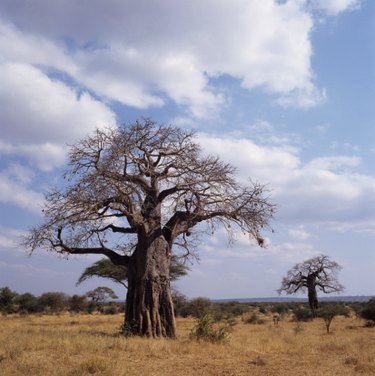Things You'll Need
Seed-starting tray
Coarse sand
Potting mix
Large bowl
Seed heat mat
Nail file
Small bowl
Shovel
Clean sand
Pea gravel

The perennial baobab tree is an African native, producing white flowers and fruit that are used medicinally. The baobab tree has a thick, short trunk with branches that resemble root systems. Producing a baobab tree from seeds is a simple project to complete at home. While care and maintenance for baobab seeds almost require no work, the germination rate for the seeds is finicky. Most gardeners wishing to produce this unusual looking tree will need to sow as many baobab seeds as they can to increase their rate of successful germination.
Step 1
Mix equal parts of coarse sand and potting mix in a large bowl. Fill the seed-starting tray with the mixed soil.
Video of the Day
Step 2
Set the seed-starting tray on top of a seed heat mat. Set the mat to remain at temperatures between 60 and 65 degrees. The heat mat will warm the soil for the baobab seeds, reducing the risk of the seeds damping off.
Step 3
Scrape the surface of the baobab seeds with a nail file. Only scrape enough of the baobab seeds to expose the inner white layer, no deeper. Scraping the outer shell of the baobab seeds is called scarification.
Step 4
Fill a bowl with cold water and soak the baobab seeds for 72 hours. Remove the baobab seeds from the soaking bowl and push them 1 inch into the warmed soil in the seed-starting tray.
Step 5
Moisten the potting mix evenly with warm water. Do not use cold water, as this may cause damping off of the baobab seeds.
Step 6
Move the seed-starting tray to a location providing indirect light, such as a windowsill.
Step 7
Continue to water the baobab seeds once in the morning and once in the evening with warm water.
Step 8
Gradually increase the amount of light the baobab seeds are exposed to every day for one week after the seeds have sprouted above the soil.
Step 9
Move the baobab seedlings outdoors in an area receiving partial afternoon shade when they have reached at least 15 to 20 inches in height. Loosen the ground with a shovel to a depth of 12 inches. Remove all weeds from the planting area.
Step 10
Incorporate a 2- to 4-inch layer of equal parts clean sand and pea gravel into the loosened soil. Plant the baobab seedling into the ground and water when the soil starts to become slightly dry.
Tip
Soaking and scarifying the baobab seeds will allow the needed moisture to enter through the seed's hard outer coating to penetrate the interior embryo, resulting in a faster, more successful germination.
Video of the Day